Though this one is sort of a tricky one, let’s talk through the symptoms of SIBO vs IBS.
I always knew I had IBS, irritable bowel syndrome, because that’s what my doctors had told me for years.
What I didn’t know is that a major underlying cause for the IBS symptoms was actually SIBO, small intestinal bacterial overgrowth, that I would ultimately be diagnosed with.
Because I have been healed now for over 5 years with no SIBO symptoms, IBS symptoms or really any digestive symptoms in general, I wanted to break both SIBO and IBS plus their symptoms down more for you so that it could potentially save you years of the headaches I personally went through.
After all, isn’t this your true goal of reading this post?
Healing faster so that you can live your life on your terms again?!
Symptoms of SIBO vs IBS
Click HERE to save this post for later.
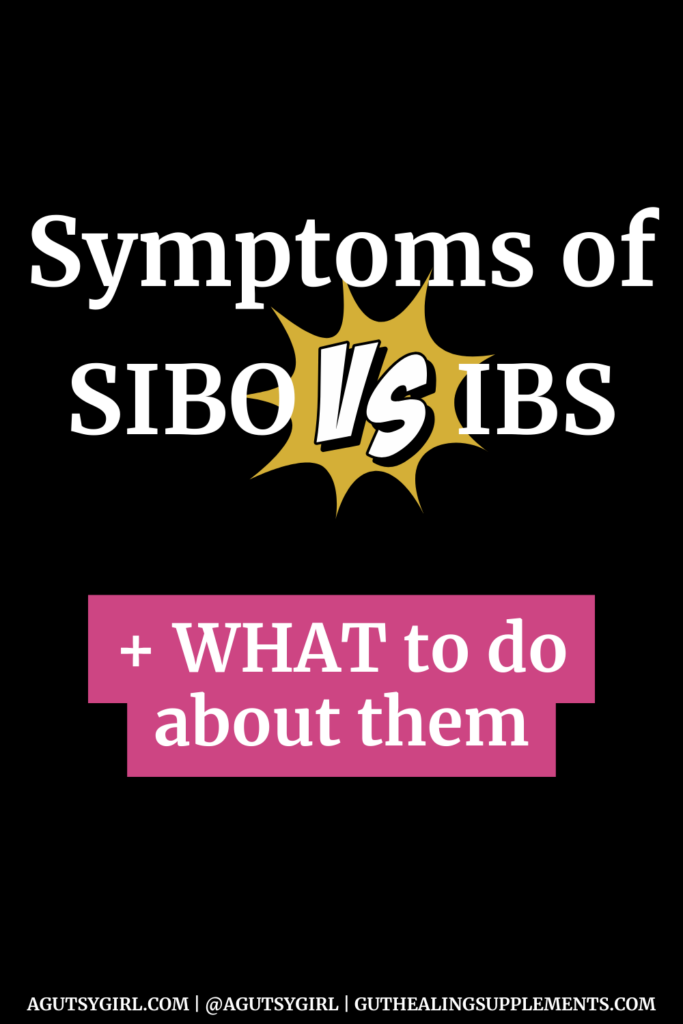
The best way for me to break down these digestive issues is to fully lay out what each of them are.
What is SIBO
SIBO stands for small intestine bacterial overgrowth.
We all have bacteria in our guts; in both the small and large intestines. This should be no surprise to you.
Those with SIBO have an abnormally large amount of bacteria in the small intestine; an abnormal increase of bacteria where it should not be.
This distinction between small and large is actually important because while we do not want an overgrowth of bacteria in the small intestine, we do, in fact, welcome bacteria in the large intestine.
Common Symptoms of SIBO
My most telling symptom was that it felt like something was “feasting” in my upper stomach constantly.
When it got really bad, I’d hear rumbling and I’d feel absolutely famished 24/7. No amount of food could satisfy the hunger pangs I’d get.
Once the feasting, rumbling feeling settled, it would drop to my lower stomach and I’d feel bloated (and crabby and more crabby and just blah).
You might not feel what I felt in particular, but other symptoms can include things like:
- bloating
- diarrhea
- constipation
- pain
- B12 deficiency
- rashes
- fatigue
- food sensitivities
- headaches
- acne
- IC (Ileocecal) valve protrusion
- all of the above (ugh, the dickens!)
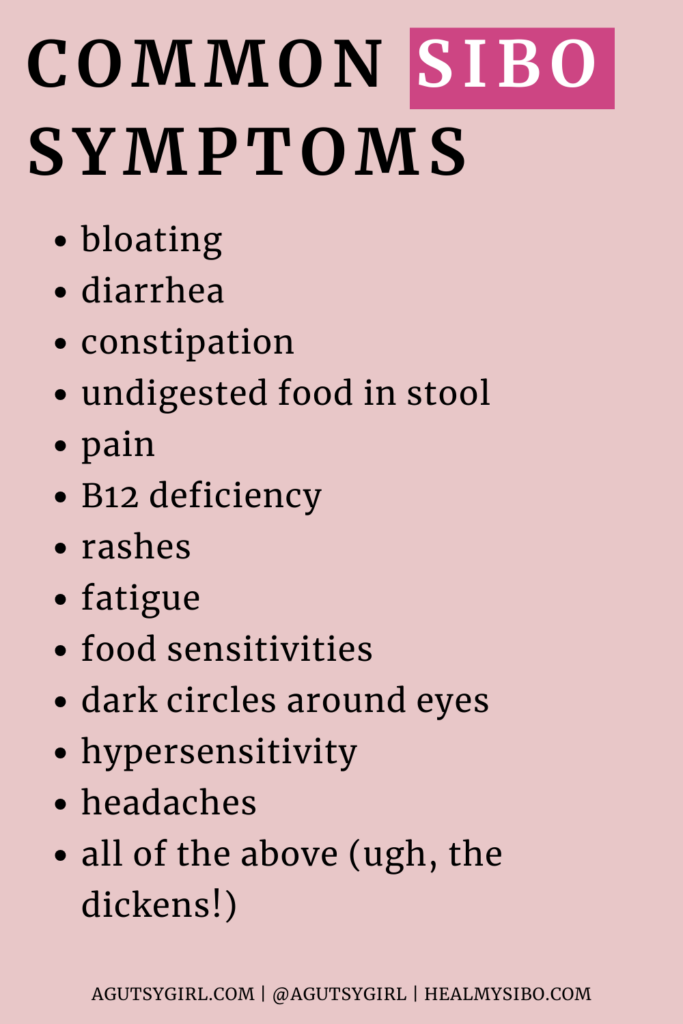
Diagnosis of SIBO
There are 2 main types of tests. The first is invasive via enteroscopy.
I don’t know anyone who has been diagnosed in this way since it requires a lot more out of patient and doctor.
Getting a SIBO diagnosis is typically done via breath testing, which is the gold standard.
This is how I was diagnosed.
The tests themselves are measuring the amount of hydrogen or methane in your breath. The Paleo Mom states (on page 299),
Neither hydrogen nor methane is produced by our cells, but rather only by intestinal bacteria. In healthy people, hydrogen- and methane-producing bacteria live almost exclusively in the large intestine, so 80 percent of the gas that is produced is expelled by flatus. When these bacteria live higher up in the digestive tract, a larger and larger percentage can be measured in the breath as they metabolize sugars.
My doctor had me tested through Commonwealth Labs.
The testing is not fun, and it requires a 24-hour preparation period before taking the test; the first 12 hours require a specific diet, and the last 12 hours require a complete fasting period.
By the way, you can also get a SIBO test online now.
See them all HERE.
Once the tests begin, you simply blow air into testing tubes and then mail those testing tubes in.
Since I have taken many SIBO breath tests, I have put together comprehensive information for exactly how to do the SIBO breath test.
Once your results come back, if you do in fact have SIBO, you’ll find out that you have:
- Hydrogen-Dominant SIBO
- Methane-Dominant SIBO
- Hydrogen-Sulfide Dominant SIBO
Note that you can also have more than one type present (I did).
FoodMarble Device + Testing Kit
It is NOT required by any means, but there IS a tool that accompanies this guide perfectly; the FoodMarble AIRE device + testing kit.
FoodMarble helps those suffering from chronic gut issues including IBS, IBD, chronic constipation, and SIBO/IMO.
They initially created a device to help people find the foods that best suit their unique digestion.
This is achieved by tracking how their hydrogen levels change in response to the food they ate.
You can also get a FODMAP intolerance kit that can help you figure out your tolerance to some of the most common FODMAP sugars (lactose, fructose, inulin and sorbitol).
The device pairs with a handy app that records all your data so over time, you can see the trends.
If you want to bypass some of the SIBO testing and opt for an at-home option, I would 100% recommend the FoodMarble Aire.
This is a small portable device that is able to provide real time results of your fermentation level after eating.
It is great for anyone suffering with SIBO, as it can provide exact methane levels and hydrogen levels post-meal.
What Causes SIBO?
So what exactly causes SIBO?
Generally, there are 4 major categories of causes.
1. Motility
The small intestine has a “cleansing wave” that sweeps bacteria towards the colon. This wave, called the migrating motor complex, should occur every 90 minutes on an empty stomach.
When there are problems with this wave, bacteria are not swept out of the small intestine and so they stay there and multiply.
Conditions that affect this wave include post-infectious IBS, hypothyroidism, and chronic stealth infections like Lyme disease and viral infections.
There are many other conditions that affect motility.
2. Digestion
The digestive juices include stomach acid, bile from your gallbladder, and pancreatic enzymes.
Besides helping you digest your food, they have the important function of helping to keep bacteria in check.
When you have a problem with the secretion of any one of these juices, bacteria will overgrow.
3. Outflow problems
This is when something is impeding the normal flow of food through the intestines and bacteria are allowed to stay in the small intestine because something is blocking their exit way to the colon.
Outflow problems are usually due to some previous abdominal surgery or endometriosis which can cause scar tissue or adhesions to form.
When this happens the normal flow is impeded, almost like a kink in the garden hose.
4. Medications
Medications can affect the normal motility of the gut or otherwise interfere with normal digestion.
These include acid blockers like Nexium, morphine, narcotics and also possibly thyroid medication.
So what was the culprit for me personally?
Well, I had to start from where I was at currently and work backwards to identify my cause which ended up being slow intestinal motility and a lack of stomach acid due to years of under-eating, chronic dieting, and an insane amount of stress.
And all of that was so hard to unpack and address.
Treatment of SIBO
While it’s not always easy to get to the SIBO diagnosis, it’s actually far more difficult to treat the overgrowth.
Treatment, quite honestly, will depend on your doctor and his/her beliefs.
These are the most common approaches not including dietary approaches:
- antibiotics
- herbal antibiotics
- elemental diet
- combination of any and/or all of the above
It truly just depends on several things.
If you like this information and want my whole e-book on SIBO, grab your copy of Reasonable SIBO.
Herbal Antibiotics
Well, natural antibiotics are still antibiotics. Bacteria still get resistant. That’s where we get our penicillins: from the plants.
Always proceed with caution on both antibiotics and natural antibiotics. Know exactly what you’re doing before doing it.
Nonetheless, many choose this route and it can be powerful.
Here is a list of 13 natural antibiotics for SIBO to consider:
- Allimax
- Berberine
- Neem
- Oregano
- Dysbiocide
- FC Cidal
- Wormwood
- Lemon Balm
- Indian Barberry Root
- Atrantil
- Cinnamon
To read about all of these in details, check out 13 Natural Antibiotics for SIBO HERE.
Elemental Diet
The elemental diet is a common protocol for SIBO treatment (typically more extreme cases).
It is a liquid diet which contains every nutrient needed for survival, but in the simplest form,; pre-digested, and making digestion easy for the gastrointestinal tract.
The Elemental Diet contains fats, carbohydrates, and amino acids (the building blocks of protein), in addition to multiple vitamins you would usually receive through food.
Consuming these nutrients in their pre-digested form starves the overgrowth of gut bacteria and causes it to die.
The estimated success rate for two weeks is about 80% compared to a success rate of only 49.5% with antibiotics.
The large difference in these two statistics is a big factor for why many will convince themselves to try the Elemental Diet.
The use of an elemental diet is a temporary diet.
And if you want to learn how to DIY the Elemental Diet, you can find that HERE.
SIBO Diet
The SIBO “diet” can be many different things, but the one thing that is typically always regarded as mandatory is following at least some version of the FODMAPS diet.
A low-FODMAP diet has saved me, but the key is in some very specific, deep-down digging I had to do.
Common diets for SIBO include:
- Low FODMAP diet. FODMAP stands for Fermentable Oligosaccharides, Disaccharides, Monosaccharides, and Polyols, which are short chain fermentable carbohydrates and sugar alcohols that are poorly absorbed by the body. The low FODMAP diet focuses on lowering and/or eliminating higher FODMAP foods containing these.
- Elemental diet. The elemental diet is a liquid diet which contains every nutrient needed for survival, but in the simplest form,; pre-digested, and making digestion easy for the GI tract. This one is a very tough diet.
- Bi-Phasic Diet. This protocol of diet combined with specific gut healing and antimicrobial phases was created by Dr. Nirala Jacobi. It is a modified version of Dr. Siebecker’s SIBO-specific diet.
- SIBO-specific diet. Created by Dr. Allison Siebecker, this diet combines the low FODMAPs and SCD (specific carbohydrate diet) diets.
- Specific Carbohydrate Diet (SCD). Created by Dr. Sidney Haas, but popularized by Elaine Gottschall. SCD is, “based on the theory that by eliminating most carbs (primarily grains, starches, dairy, and sugars) and allowing only specific carbs that require minimal digestion, it can reduce inflammation and make eating enjoyable for people with gastrointestinal (GI) disorders.”
- Low Fermentation Diet. According to Dr. Mark Pimentel, “This is a somewhat restrictive eating plan that allows patients to consume easily digested starches and sugars. It limits fermentable carbohydrates that can feed bacteria. Patients need to reduce fiber, fructose, the natural sugar found in fruit, as well as lactose, the sugar in milk. Meat and fish and other sources of protein are allowed and so are easy-to-digest carbohydrates including rice, potatoes, and sweet potatoes.” (Note: I’m not certain, but this might be the same as the Microbial Reset I tried in 2018. You can learn more about it + see a food list for the diet HERE.)
Healing SIBO
Healing from SIBO, as mentioned, is not easy.
This is because you can take everything mentioned above and still not heal.
The reason will come down to 2 very important pieces:
- Lifestyle factors; the lifestyle changes you are not willing to make and/or
- Identifying the root cause for why the overgrowth was there to begin with
The good news?! These are the two main areas I’m able to help you focus on in detail, on a very individualized basis so that you get results faster.
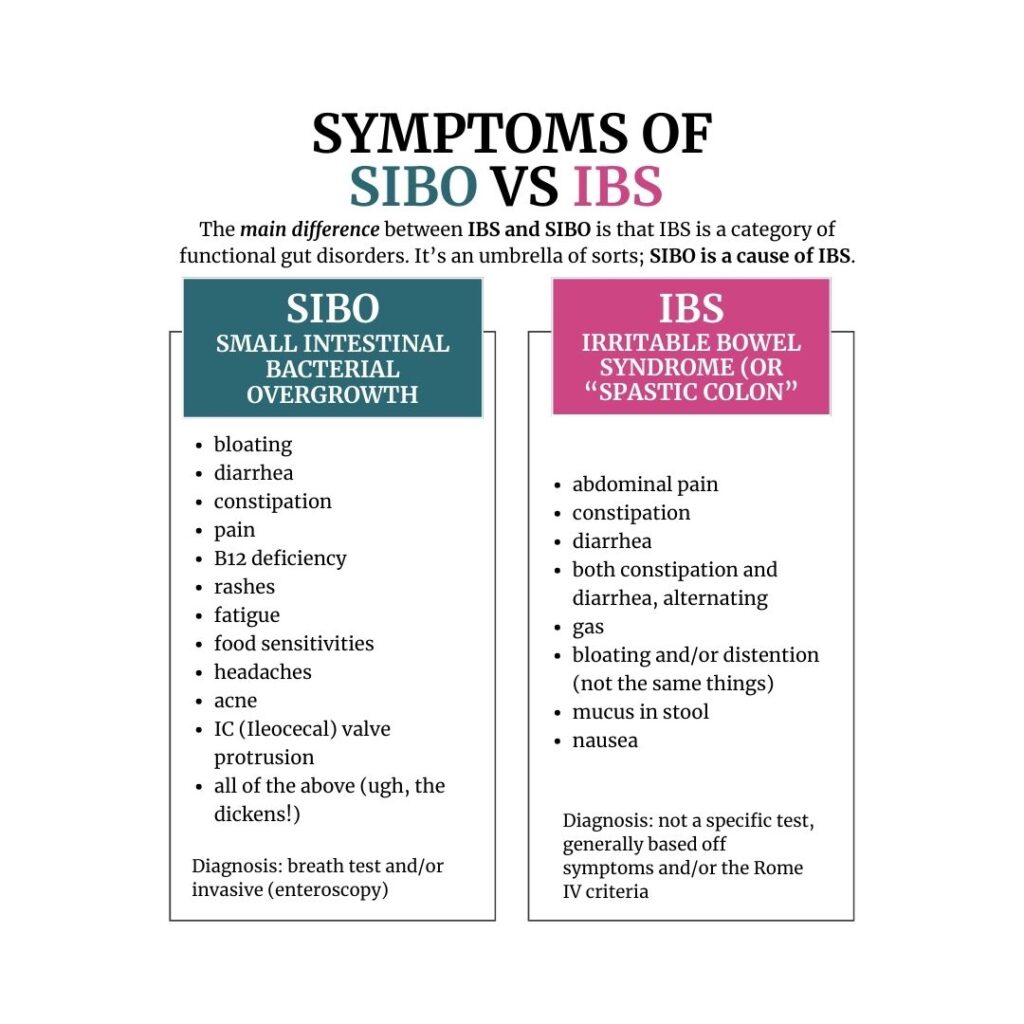
What is IBS?
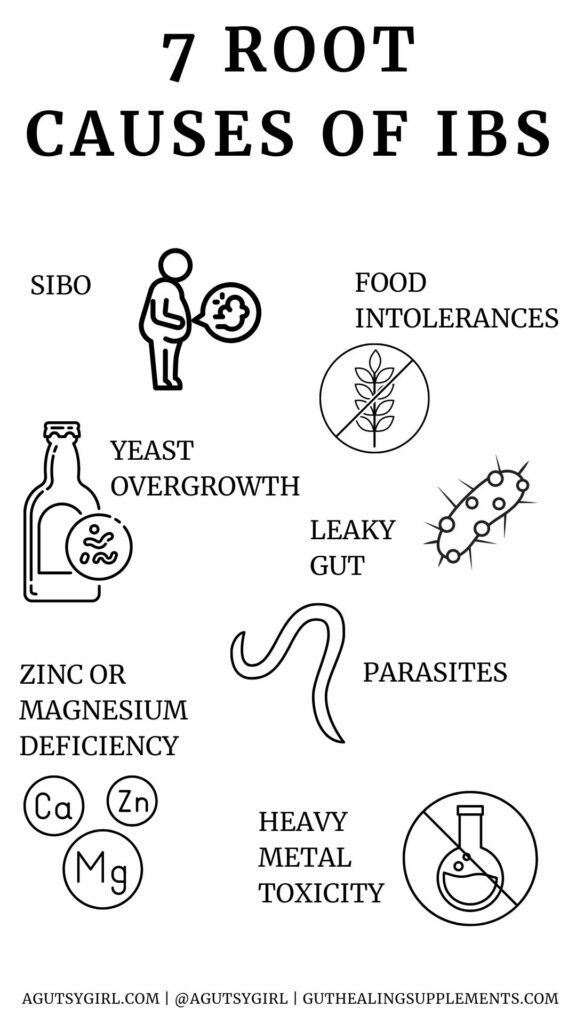
IBS stands for irritable bowel syndrome which is vastly different from IBD (inflammatory bowel disease).
Irritable Bowel Syndrome is known as “spastic colon,” and since it’s a syndrome it’s just a set or range of symptoms that may fall into the defining category, Irritable Bowel Syndrome.
Even though there is no permanent damage done with IBS, it still can cause day-to-day pain, discomfort and misery for those who battle it.
This is why I never say “it’s just IBS.” And that’s also why I always put “just” in quotation marks.
According to the International Foundation for Functional Gastrointestinal Disorders, IBS affects at least 10% to 20% of adults in the U.S. — mostly women — and is second only to the common cold as a cause of absenteeism from work. (source)
Finally, and this is something that people overlook all the time, but for which I’ve set out to help with.
IBS usually begins in late adolescence or early adult life — most often at times of emotional stress. Source
The main difference between IBS and SIBO is that IBS is a category of functional gut disorders. It’s an umbrella of sorts; SIBO is a cause of IBS.
IBS patients typically get thrown into a bucket of “who the heck knows what’s wrong.” A diagnosis of IBS is then slapped on.
Common Symptoms of IBS
Everyone is different, namely because some have the IBS-C (constipation) version and others have the IBS-D (diarrhea-predominant IBS) version while others have the alternating version which includes both constipation and diarrhea.
But in general, here are many common symptoms of IBS:
- abdominal pain
- constipation
- diarrhea
- both constipation and diarrhea, alternating
- gas
- bloating and/or distention (not the same things)
- mucus in stool
- nausea
You’re liking taking note currently that SIBO and IBS share similar symptoms. And this is why a proper diagnosis is so critical.
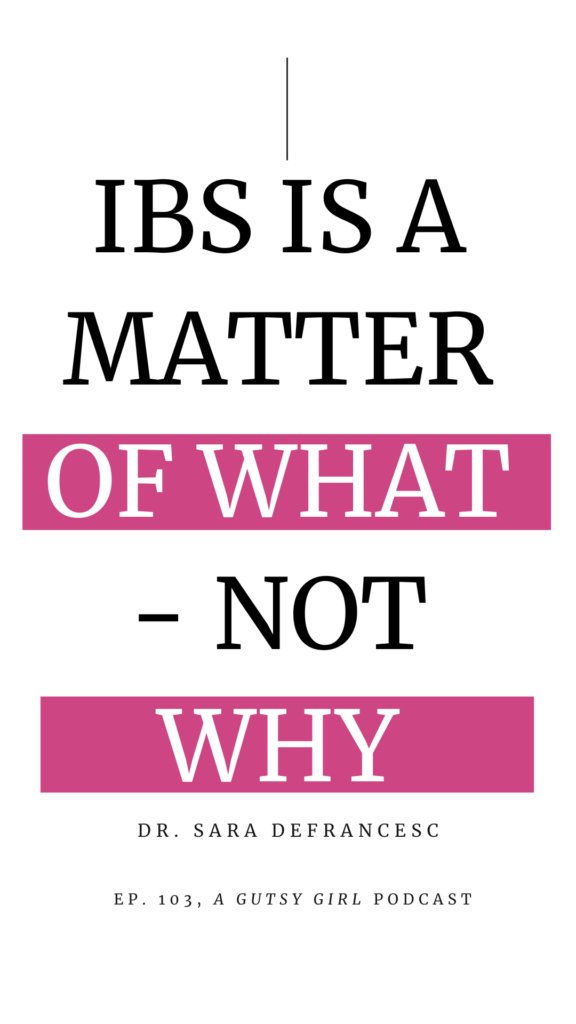
IBS Diagnosis
While SIBO can be diagnosed via breath samples, there isn’t a test like this in particular for IBS.
According to the Rome IV criteria, the diagnostic criteria of IBS requires the presence of the following:
- Abdominal pain at least 4 days per month over at least 2 months associated with one or more of the following:
- Related to defecation
- A change in frequency of stool
- A change in form (appearance) of stool
- In children with abdominal pain and constipation, the pain does not resolve with resolution of the constipation (children in whom the pain resolves have functional constipation, not IBS)
- After appropriate evaluation, the symptoms cannot be fully explained by another medical condition
*Criteria fulfilled for at least 2 months prior to diagnosis. Note: There are different variations of time. Some say 2 months, others say 3 months, and yet even other sources say 6 months.
What Causes IBS?
To be clear, no one truly knows what causes IBS.
Here are some theories:
- Disturbance in the gut-brain axis.
- Irregular colon motility patterns. In other words, how fast food moves through you is either too fast or too slow.
Let me be very clear, I think the statement “it’s just IBS” is BS. I believe that when given the diagnosis “IBS,” there is always more to the story.
Said IBS doesn’t get any better, usually gets worse, because the root cause is not determined.
In fact, HERE are 7 roots causes of IBS. Note: You’ll see that SIBO is one of them in the linked article.
Treatment of IBS
If you have heard of one way to treat IBS then you’ve likely heard 15 other ways as well.
This one is 110% subjective based on your doctor, personal beliefs, and choices.
Here is a list of several treatment options (not an exhaustive list and not including many/going into detail on lifestyle things which are huge factors):
- Dietary changes
- more or less fiber
- increase water
- specific dietary changes and/or dietary protocol templates (that you then customize for you)
- avoid or cut caffeine and alcohol
- LDN
- Stress management
- Acupuncture
- Anti-diarrhea medication
- Antidepressant medications
- Psychological therapy
- Pain relievers
- Surgery
- Supplements – HERE are my 9 best supplements for IBS
Healing IBS
Again, what heals IBS and how long that takes will ultimately come down to the 2 main factors I mentioned for SIBO:
- Lifestyle factors; the lifestyle changes you are not willing to make and/or
- Identifying the root cause for why the overgrowth was there to begin with
Commonalities, Overlaps, and Differences in the Symptoms of SIBO vs IBS
When thinking about SIBO vs IBS, here are some things I want to point out:
- Weight loss (or weight gain) can be indicative of either.
- There is a leaky gut (intestinal permeability) component in both.
- Your digestive system is definitely not functioning optimally; you do not possess a healthy gut.
- You’re likely to have abdominal bloating of some sort.
- While your doctor may have prescribed a PPI (proton pump inhibitors) for what they are calling ‘Acid Reflux’ and/or GERD, that approach might be reducing your stomach acid too much and low stomach acid is a common culprit for IBS and SIBO symptoms.
- Your bowel habits are all over the place; nothing is very consistent.
- You could have multiple nutritional deficiencies. In fact, with SIBO, I was so deficient in Vitamin B 12 that upon diagnosis I did B12 injections to my stomach for a long period of time.
- An overuse of antibiotics will not cure either SIBO nor IBS.
- There is almost always an underlying condition or circumstance for why the SIBO or IBS is there to begin with.
- Your immune system is likely not functioning optimally.
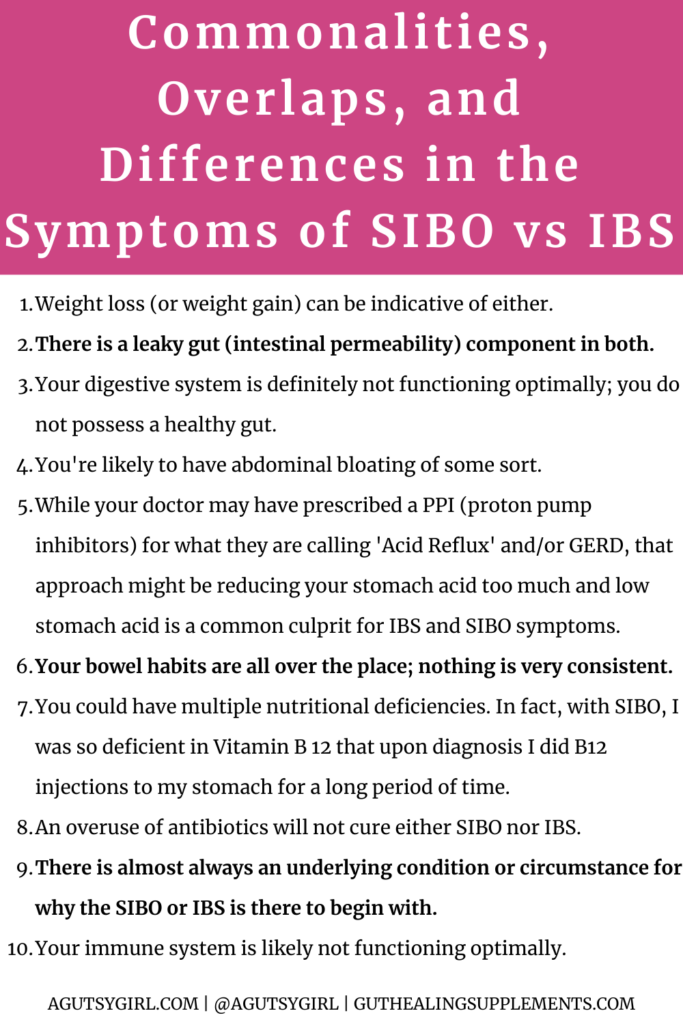
No matter what, if you want to truly know if it’s SIBO or IBS, you will need a healthcare provider of some sort.
If you have access to the Master Gutsy Resource Spreadsheet, I have a tab for “Practitioner Referrals” that might help get you started in finding your right person.
SIBO, IBS and…..
I’m not just passionate about SIBO and IBS as stand alone conditions.
Even though they, in and of themselves, are frustrating and hard to overcome, they also have something else in common: refusal to address them will lead to even more health problems, stomach issues, autoimmune diseases and more.
I know this because my father was told, “It’s just IBS” for years. He never changed anything, never sought out further help to address the exact cause of IBS. Ultimately, he passed away from Colon Cancer in 2019.
It was hell watching him pass, and it’s been hell since.
So please believe me when I tell you that this stuff is so important.
And, that I’ve devoted my existence to getting you answers and relief.
Questions? Thoughts? Leave them in the comments below.
If you liked this post, you might also enjoy:
- Can Food Allergies Cause Weight Gain?
- How to Test for Inflammation with a C-Reactive Protein Test
- Lactulose Hydrogen Breath Test
Xox,
SKH
🤰 bloating be gone! weight loss through optimal gut health for women
💃ʜᴇᴀʟ ʏᴏᴜʀ ɢᴜᴛ. ʜᴇᴀʟ ʏᴏᴜʀ ʟɪfe.
🫶🏻 founder gutbyome.com

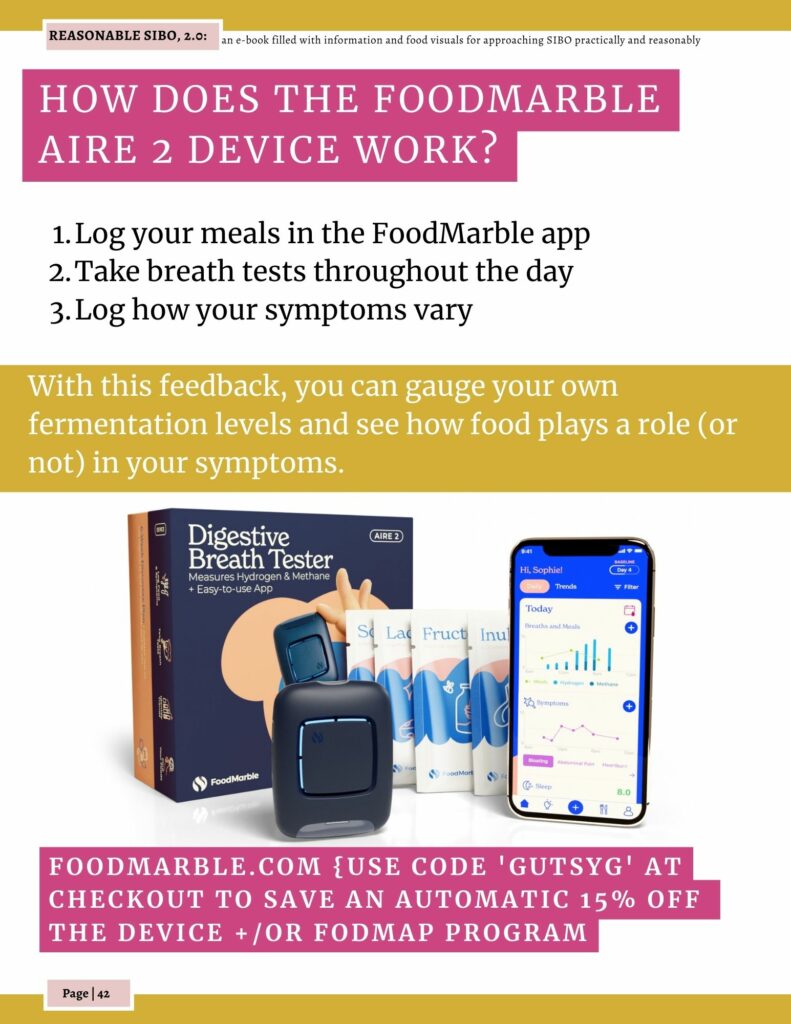


![Cellular Healing (+ Diet Food List) [Episode 56 with Paola Xhuli]](https://agutsygirl.com/wp-content/uploads/2022/10/ep-56-Paola-Xhuli.png)

![Bullet Journal [6 Things I Learned from Keeping One]](https://agutsygirl.com/wp-content/uploads/2019/08/journal-featured-1.png)

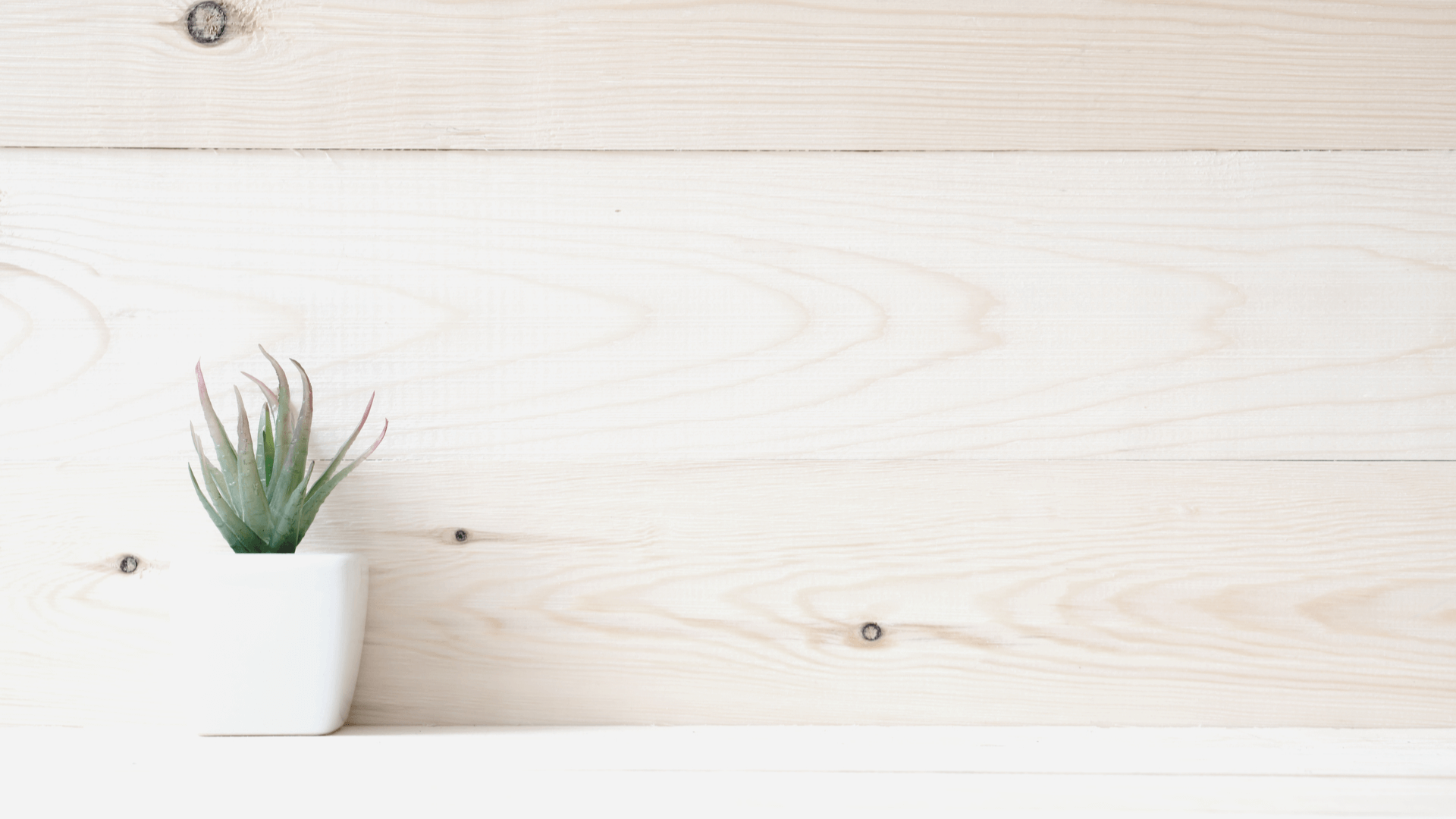
Hi Sarah! I hope you are doing well. It’s good to hear you are finding your way to healing. This is a very informative piece, and I hope it helps some people who are also suffering. Those tests do not sound like fun. You look great in that workout shot, though!
Thank you dear!
I have been diagnosis with Candida Overgrowth, is SIBO the same thing. Prior to the diagnosis for 25 years I was diagnosis with IBS, until my new doctor took a food allergy test. Which showed Candida Overgrowth along with food allergies to wheat, dairy, eggs and yeast. There are more food allergies, but those were very easy for me to give up. It has been a long road to recovery, I still get digestive upsets that create a incontinence in the form of diarrhea. I have eliminated wheat, dairy, eggs, etc, and have lost 30 pounds. Actually I am now too skinny and am looking for foods to eat to help me gain a little. I went from nearly 170 pounds to 125 in eleven months. The good thing is that most days for me are good, only once in awhile I still get uncontrollable diarrhea. I am always looking and researching this, in which I now know is hidden in our foods in our American diet. Any help would be mostly appreciated.
HI Sandy! There are so many things that could be going on. I don’t know for sure, and I am not a doctor. I’d recommend you get a comprehensive testing portfolio done. If it’s diet and lifestyle you’d like to explore more, please do join our 28-day group: http://bit.ly/skhjanp
you, ma’am, are my inspiration! I am going to try to do a REAL SIBO approach during a 40 day yoga program starting Jan 6. I feel some things coming back on and want to tackle them.
Oh I desperately want to be bloat-free! Just diagnosed with IBS. You’re going to be my inspiration… Someday I won’t bloat!
You’re so kind, Katie!
From what I’ve read, garlic is a fodmap. So how does it help SIBO if you’re avoiding fodmaps? Thanks!
Garlic is super high FODMAP. However, in this way it’s used as an antimicrobial. I’d imagine that it’s combined with many other things for a very specific reason. That said, when I took a similar supplement to try to eradicate my SIBO (instead of the antibiotic), it did *not* work for me. Everyone is different, though. Hope that helps!
Also, to be clear, this post was written at a time when that protocol WAS working for me, but mine was to severe and ended up needing the antibiotic, which you can read about by searching “Rifaximin” on my blog.
Thanks so much for posting this! I was diagnosed with SIBO symptoms for three years now and have had the same awful, extreme hunger feeling in my upper gut. This post gives me hope I’m on the right track to heal my sibo, and that it’s possible 🙂 Thanks for the inspiration <3
You are welcome! Good luck to you on your healing journey, Mackenna! xo
I also have that permanent starving hungry feeling. It just started one day and never left. You don’t read about it much with SIBO so it’s a relief to see I’m not crazy and the only one experiencing it!
You are definitely **not** the only one!
I hope you don’t mind me asking, but did yours shift after you took rifaximin (I know you said it took a 3 week course to start seeing positive effects) or before that? I’m going down the herbal route right now but I do have rifaximin stockpiled just in case!
I swear by Rifaximin.
So happy to have found this article. I feel extreme hunger 24/7 and it is quite literally driving me insane. I am super bloated all of the time, and have so many food restrictions. It is really hard to feel starving all of the time yet also not have an appetite. I am doing the herbal protocol right now but am afraid it’s not working, do I have to find a doctor or gastro to prescribe me rifaximin?